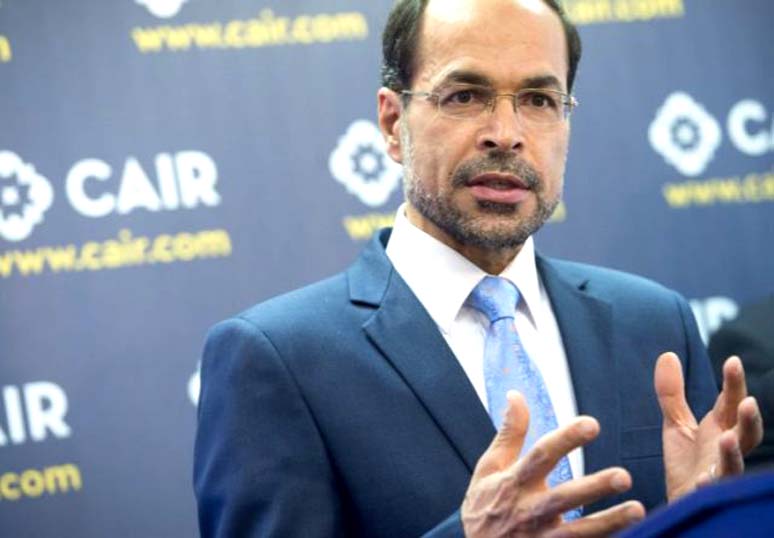
Agency, Washington :
Muslim, Christian and Jewish leaders gathered at the national headquarters of the Council on American-Islamic Relations (CAIR) in Washington, D.C., Wednesday to condemn expected orders by President Trump that would stop the resettlement of Syrian refugees in the United States and impose travel restrictions on visitors from several other Muslim countries.
CAIR co-founder and executive director Nihad Awad said that such action, which Trump has yet to formally announce but which he repeatedly endorsed during his presidential campaign as a national security measure, “does not make our country safer.”
Rather, Awad said, “it will hand a propaganda tool to our enemies who promote a false notion of an American war on Islam.”
Trump signed two executive orders Wednesday, which included provisions to begin construction of a wall along the southern border, increase detention facilities to hold more illegal border crossers, give border agents more power to enforce immigration laws and cut federal funding to cities that offer sanctuary to certain undocumented immigrants.
An additional order, which Trump is expected to sign as soon as Thursday, would impose an indefinite ban on Syrian refugees as well as a temporary hold on the resettlement of all refugees from other parts of the world. The order would also ban anyone from Iran, Iraq, Libya, Somalia, Sudan, Syria or Yemen from traveling to the U.S. for one month.
“We’ve already seen an unprecedented spike in anti-Muslim bigotry in recent months,” said Awad, adding that efforts to limit immigration from specifically Muslim countries would increase Islamophobic sentiment.
Trump’s approach to immigration, Awad continued, including his “multibillion-dollar monument to racism on our border with Mexico” as well as the expected travel ban, “flies in the face of the American inclusion that we all hold dear.”‘
Rabbi Joseph Berman, manager of government affairs for the grassroots advocacy organization Jewish Voice for Peace, agreed with Awad, pointing to the Holocaust and his own personal experience as the grandson of refugees as a warning.
Berman said that one side of his family fled Nazi Germany in the 1930s, while his grandparents on the other side survived the Auschwitz concentration camp in Poland. Though they were all lucky enough to receive asylum in the United States, Berman noted, there were “many who did not make it out and died as a result.”
“Make no mistake that suspending immigration [and] refugee resettlement will result in more deaths,” he said. “People will die in refugee camps.”
Muslim, Christian and Jewish leaders gathered at the national headquarters of the Council on American-Islamic Relations (CAIR) in Washington, D.C., Wednesday to condemn expected orders by President Trump that would stop the resettlement of Syrian refugees in the United States and impose travel restrictions on visitors from several other Muslim countries.
CAIR co-founder and executive director Nihad Awad said that such action, which Trump has yet to formally announce but which he repeatedly endorsed during his presidential campaign as a national security measure, “does not make our country safer.”
Rather, Awad said, “it will hand a propaganda tool to our enemies who promote a false notion of an American war on Islam.”
Trump signed two executive orders Wednesday, which included provisions to begin construction of a wall along the southern border, increase detention facilities to hold more illegal border crossers, give border agents more power to enforce immigration laws and cut federal funding to cities that offer sanctuary to certain undocumented immigrants.
An additional order, which Trump is expected to sign as soon as Thursday, would impose an indefinite ban on Syrian refugees as well as a temporary hold on the resettlement of all refugees from other parts of the world. The order would also ban anyone from Iran, Iraq, Libya, Somalia, Sudan, Syria or Yemen from traveling to the U.S. for one month.
“We’ve already seen an unprecedented spike in anti-Muslim bigotry in recent months,” said Awad, adding that efforts to limit immigration from specifically Muslim countries would increase Islamophobic sentiment.
Trump’s approach to immigration, Awad continued, including his “multibillion-dollar monument to racism on our border with Mexico” as well as the expected travel ban, “flies in the face of the American inclusion that we all hold dear.”‘
Rabbi Joseph Berman, manager of government affairs for the grassroots advocacy organization Jewish Voice for Peace, agreed with Awad, pointing to the Holocaust and his own personal experience as the grandson of refugees as a warning.
Berman said that one side of his family fled Nazi Germany in the 1930s, while his grandparents on the other side survived the Auschwitz concentration camp in Poland. Though they were all lucky enough to receive asylum in the United States, Berman noted, there were “many who did not make it out and died as a result.”
“Make no mistake that suspending immigration [and] refugee resettlement will result in more deaths,” he said. “People will die in refugee camps.”

